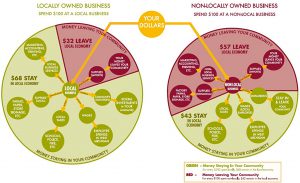The Necessity of Buying Local
A sustainable local economy is all about keeping local business going and local people employed. This in turn drives the tax base and helps the community at large be a lot happier. Yet, most people will go to the big box retailers to save a little money, not realizing how it harmfully impacts their own community. So let’s make this clear: “Buying local does not mean spending more for less.”
When people are presented with the option paying less of a product versus paying more, most would choose to save money. However, when presented with the option of paying a slight premium for a good or service from a local merchant and realizing they are helping there town survive and even thrive versus a discounted product at a big box, most people would opt for the former. Now add to that the experience of buying from someone you know and trust and the added feeling of community, it becomes a slam-dunk to buy local. There is a lot of data to support this notion but a recent study does a nice job of depicting the flow of dollars.
A study in Michigan got to the bottom line of buying local. They found thatbuying from your friendly and neighborly vendor or store does drive your local economy 58% better than buying from the big brand outlets.

For every $100 Spent to a Locally Owned Business, $68 stayed in the local economy vs the same $100 spent non-locally $43 stayed local.
Click on image to enlarge.

This is good news, it shows how much more benefit the entire community receives when people buy local. This is neither a definitive study nor the only way to cut the math. But it does show what is possible and useful about staying in your neighborhood. When you really start to look at the various sectors in the local economy, what is most impressive is that food follows an even greater path to putting more back into the community than most goods do.
Many small and mid-size towns have been heavily, and usually negatively, impacted by the brand and big box retail plays. Many shops and store fronts have been forced to shut down. Many jobs have left and the towns feel abandoned or destitute. The other negative effect that mass merchants have had is in the more mid to upscale suburban towns. One can literally walk any upscale neighborhood and find it to be identical to any other one. They all house the same brand name stores and faceless people. Is this really what we want from our local towns?
We are going to have to unlearn some lessons in scale and economics as we enter a new era of optimizing around communities not just the bottom line of one business.

